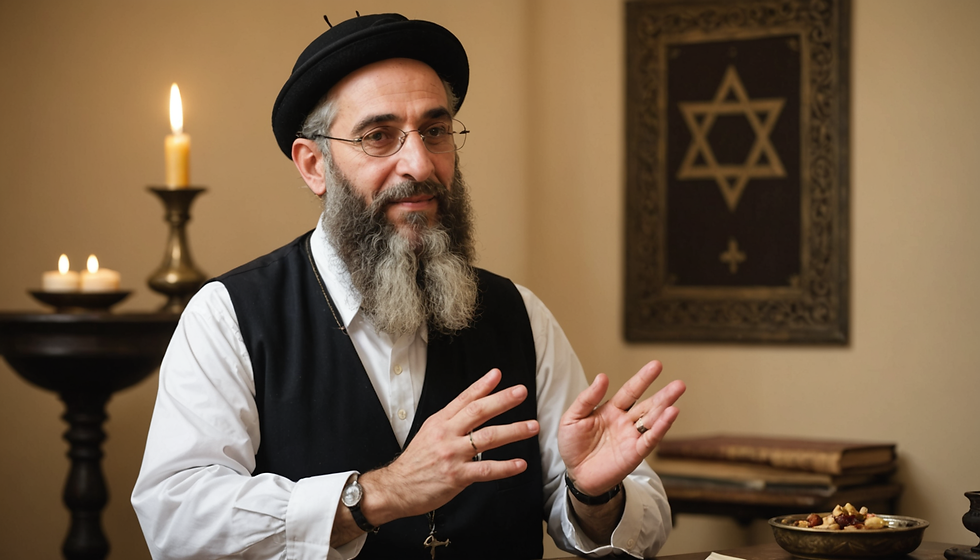The Untold Legacy: Exploring the Unknown Narratives of Ashkenazi Jewish Descents and Judaism
- Amina Aliomar
- Jan 24, 2025
- 3 min read

The story of Ashkenazi Jews unfolds like a captivating novel filled with history, culture, and unique narratives that often go unnoticed. Emerging primarily from Central and Eastern Europe, this influential group has made substantial contributions to religious life and broader societal narratives. Their history is not merely a sequence of events, but a profound journey marked by resilience, creativity, and rich traditions that deserve a closer look. Here, we explore the distinct cultural identity of Ashkenazi Jews, their religious practices, historical struggles, and the significant impact they have had on Jewish life and beyond.
Historical Background of Ashkenazi Judaism
The term "Ashkenazi" describes Jews who settled in the Rhine Valley of Germany during the early Middle Ages. The roots of Ashkenazi Judaism trace back to the 9th century and have evolved over the years, influenced by the cultures surrounding them.
During the Medieval period, Ashkenazi Jews developed unique religious customs and interpretations of Jewish law, setting themselves apart from Sephardic Jews, who lived in Spain and North Africa. This separation paved the way for the creation of distinct languages, particularly Yiddish, which combines elements of German and Hebrew—today, approximately 1.5 million people speak Yiddish worldwide.
Their historical narrative features both flourishing communities and tragic events. Expulsions and persecutions punctuated their journey, culminating in the Holocaust, during which nearly 6 million Jews—about 90% of the Ashkenazi population in Europe—were exterminated. The resilience of Ashkenazi Jews in the face of such devastating adversity is a testament to their unwavering faith and enduring spirit.
Cultural Practices and Traditions
The cultural heritage of Ashkenazi Jews includes various religious practices, music, and culinary traditions. The customs observed during Jewish holidays reflect unique interpretations of ancient rituals.
For example, the Ashkenazi celebration of Passover features distinctive dishes such as matzo ball soup and gefilte fish. These meals convey stories of survival and adaptation, influenced by the resources available in the diaspora. During Passover, approximately 70 million matzah sheets are produced each year—serving as a reminder of the Jewish people's flight from Egypt.
Yiddish theater and folk music also play a significant role in preserving Ashkenazi culture. These artistic forms emerged to narrate the joys and struggles of daily life, connecting generations. One notable example is the Yiddish theater movement that flourished in the early 20th century, producing iconic performers like Zero Mostel and Molly Picon.
The humor inherent in Yiddish culture stands out as a vital aspect of Ashkenazi identity. Through laughter and wit, this community copes with adversity, reflecting their strength in navigating a complex world. This blend of tradition, storytelling, and humor ensures Ashkenazi culture remains vibrant and engaging.
Religious Life and Community
Judaism for Ashkenazi Jews is more than a mere religion; it encapsulates a way of life that fosters a strong sense of community and belonging. Prayer services, often conducted in Hebrew and Yiddish, are central to Ashkenazi religious practice.
The synagogue serves as a vital communal space where spiritual, social, and educational activities converge. Renowned rabbinical authorities from historic Yeshivas in Poland and Lithuania, such as the Chofetz Chaim and Rabbi Samson Raphael Hirsch, have greatly influenced religious thought and practice among Ashkenazi Jews.
Education is highly valued within these communities, with a particular focus on Talmud study. This commitment to learning has produced many scholars who have significantly contributed to both Jewish thought and broader intellectual fields. Jewish educational institutions have reported that students who study Talmud exhibit advanced analytical skills—demonstrating the relevance of these teachings today.
As the years passed, Ashkenazi Jews adapted to new environments, evolving their religious practices to resonate with their unique experiences. This adaptability led to the emergence of various movements within Judaism among Ashkenazi communities, including Ultra-Orthodox, Conservative, and Reform traditions—each representing unique responses to contemporary challenges.
Reflecting on the Ashkenazi Legacy
The untold narratives of Ashkenazi Jewish descents weave a story rich in history, vibrant culture, and deep spirituality. Understanding these narratives is crucial to appreciating the broader Jewish experience and the diverse identities present within it.
As we examine these legacies, we gain valuable insights into the resilience of the Ashkenazi community and their profound impact on society as a whole. By embracing the stories of Ashkenazi Jews, we not only honor their past but also enrich our understanding of the complexity of Jewish identity today



Comments